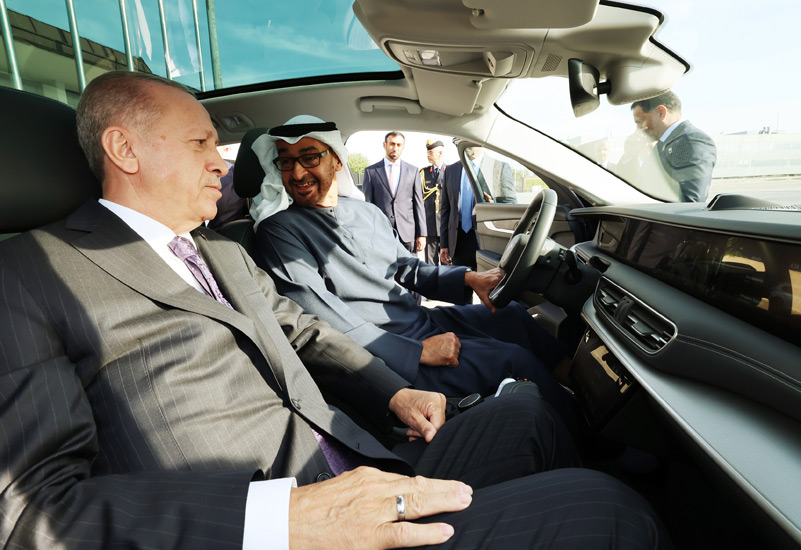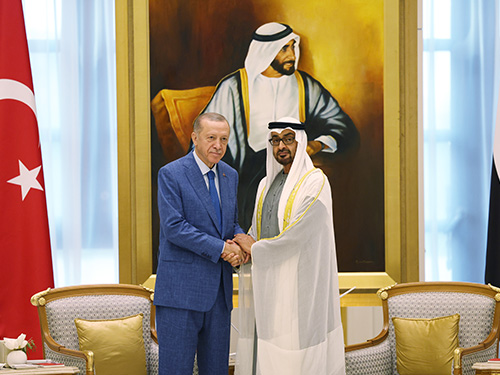Levent Kenez/Stockholm
Criticism has been voiced by opposition lawmakers and civil society groups regarding approval of the an energy agreement between Turkey and the United Arab Emirates (UAE) signed in July 2023, which President Recep Tayyip Erdogan sent to parliament for approval on December 12. The opposition accuses the financially strained Erdogan government of granting privileges to the UAE in exchange for financial support. According to the opposition, the agreement is seen as hindering competition by favoring the UAE in the energy sector, thus limiting opportunities for local and other foreign companies.
The agreement, which will be valid for 10 years, covers the construction of wind, solar energy, hydroelectric and coal-fired power plant projects. While the Turkish side facilitates land allocation, regulatory ease and environmental specifications, the UAE side will provide financing.
In the text justifying the agreement sent to the parliament, Erdogan said the UAE has shown increased interest in renewable energy in recent years, alongside its significant oil and natural gas resources, aligning with global energy transformation efforts. According to Erdogan, the agreement aims to facilitate projects in renewable and clean energy technologies, battery storage, electric interconnection lines, natural gas or clean and domestic coal-fired thermal power plants, rare earth elements, carbon capture, usage and storage, energy efficiency, nuclear energy and hydrocarbons in both countries and in third countries. Additional agreements may be concluded as needed for the development of investment-worthy projects between the parties.
“The agreement contributes to establishing a strategic partnership in the energy sector between the two countries, increasing mutual investments and enhancing cooperation,” Erdogan added.
According to the agreement, the parties will develop and implement various projects in Turkey. These projects include renewable and clean energy initiatives such as offshore wind projects with a capacity of up to 2,500 MW, onshore wind and solar projects with optimized battery storage capacity of up to 3,000 MW and projects for producing green hydrogen and/or green ammonia with a capacity of up to 5,000 MW. Additionally, the agreement covers pumped storage hydroelectric power plant projects with a capacity of up to 2,000 MW.
Furthermore, the parties have agreed to cooperate on grid and transmission projects, including battery storage projects with a capacity of up to 1,000 MW and electricity interconnection projects in third countries.
In terms of thermal power plants, the agreement encompasses combined cycle gas turbine power plant projects with a total capacity of up to 3,000 MW, which includes the planned 1,200 MW-1,800 MW combined cycle power plant in Ambarlı, İstanbul. Additionally, clean and indigenous coal-fired power plant projects with a capacity of up to 3,000 MW are included.
The agreement also addresses natural resources and new technologies, with projects focused on rare earth metals, other hydrogen-related initiatives and carbon capture, utilization and storage.
Lastly, the parties have committed to promoting energy efficiency through projects such as the utilization of waste heat and renewable heat, district heating and cooling initiatives, energy efficiency investments in end-use sectors and collaboration on Energy Service Company (ESCO) projects.
At a parliamentary committee meeting last week, main opposition Republican People’s Party’s MP and shadow energy minister Deniz Yavuzyılmaz claimed that even more privileges were granted to the UAE than those provided to Russia for the Akkuyu nuclear power plant currently under construction on the Mediterranean coast of southern Turkey, describing the agreement as a political capitulation. Deniz stated that the investments to be made were secured through a bilateral international agreement and sought to be exempt from domestic legal scrutiny.
The Chamber of Electrical Engineers released a statement criticizing the agreement, labeling it as a process of granting privileges without tenders. The agreement prioritizes allocating natural resources and electricity production areas to the UAE without imposing any obligations, potentially allowing them to profit. It plans to allocate capacities for various energy projects, including offshore wind energy, hydroelectric power plants and renewable energy systems, totaling a significant portion of Turkey’s energy capacity, the chamber claimed. The chamber also asserts that another international agreement with Saudi Arabia, although details remain undisclosed, suggests cooperation on critical minerals essential for emerging technologies. This includes minerals used in electric vehicles and solar panels, raising concerns about the control of Turkey’s strategic resources.

“These agreements risk compromising Turkey’s sovereignty and future by granting undue privileges and potentially relinquishing control over vital resources to foreign entities,” the statement reads.
Veteran journalist Çiğdem Toker, criticizing the agreement, recalled Finance Minister Mehmet Şimşek’s statement last July following the signing of the agreements in the UAE in which he expressed gratitude for the UAE’s continued strong support for Turkey.
According to Toker, granting capitulation-like privileges while expressing gratitude is indeed odd. Such a scenario, which officially amounts to bowing down to the UAE, raises the question, “What is the price for these privileges?”
Toker asked, “Are these privileges the price for swap arrangements that help to portray the reserves in the central bank as full when they are depleted? If not, what else is the price?”
In July President Erdogan visited Saudi Arabia, Qatar and the UAE with a delegation of 200 businesspeople. The visit marked a continuation of efforts aimed at normalization of ties with Saudi Arabia and the UAE, with which Turkey has faced significant issues in recent years. During the trip Erdogan had discussions with Saudi Crown Prince Mohammed bin Salman, Qatari Emir Sheikh Tamim bin Hamad Al Thani and UAE leader Sheikh Mohammed bin Zayed Al Nahyan. The focal point of Erdogan’s heavy agenda was the anticipated foreign direct investment and joint-venture projects Turkey expects from the Gulf countries.
Following the visit Turkish officials announced that the UAE would provide $8.5 billion in loans to assist with the damages caused by devastating earthquakes on February 6, 2023. As part of this assistance, $3 billion would be transferred to Eximbank as the initial installment. Additionally, in 2022, the UAE signed a $5 billion swap agreement with the Turkish Central Bank.
A report by Bloomberg had previously indicated that Turkey would receive $25 billion in funds through company sales and privatization from Gulf nations. Reuters, on the other hand, highlighted an expectation of $10 billion in the short term and a total of $30 billion in direct investment in the long run. Reports in the Turkish media went beyond these figures, suggesting an investment in Turkey that would significantly exceed $50 billion.












